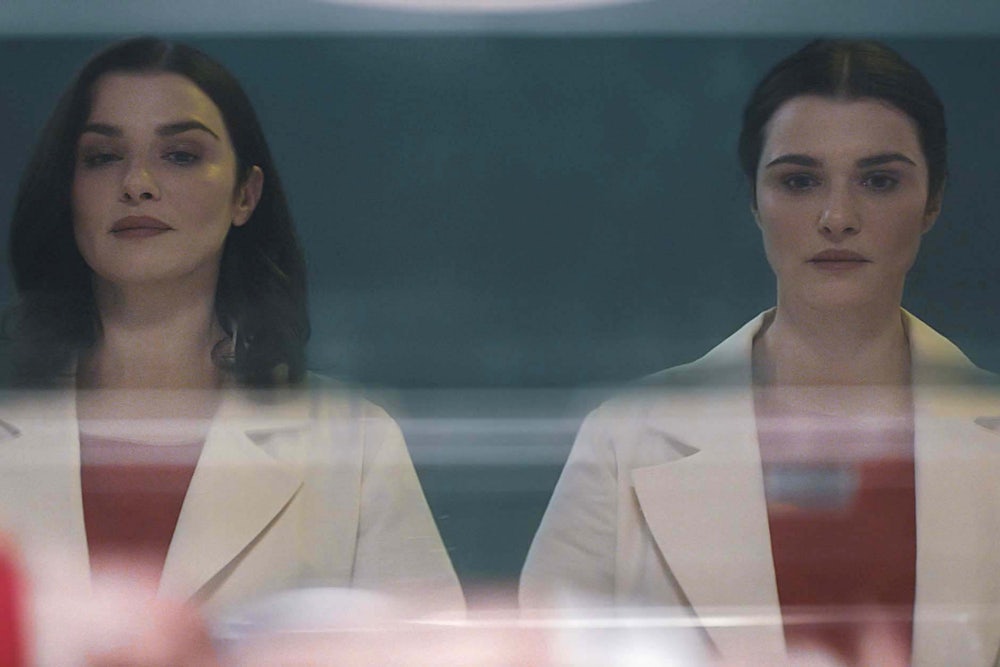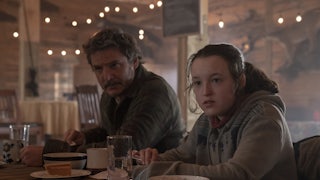At the start of David Cronenberg’s 1988 film Dead Ringers, twin boys, blond and bespectacled, walk out of their front door. “I’ve discovered,” one informs the other, “why sex is.” It has to do with the fact humans don’t live underwater. If we did, we would be like fish, he has decided; we would lay eggs and fertilize them. As they walk down the street, the boys see a girl their age sitting on their stoop. “Raffaella, will you have sex with us in our bathtub?” one shouts. “It’s for an experiment.” Raffaella opts not to lend her body to science, or at least not to these scientists. Their pride hurt, the twins look for a gendered explanation. “They’re so different from us,” one of the boys laments, “and all because we don’t live underwater.”
“What difference would sexual difference make?” was one of the questions I had before viewing Dead Ringers, a new Amazon series loosely adapted from the film, starring Rachel Weisz. In the 1988 version, Jeremy Irons plays Beverly and Elliot Mantle, highly sought-out fertility doctors, whose successful practice is threatened when Beverly begins a relationship with Claire (Geneviève Bujold), a glamorous patient who gets him addicted to drugs. The film is a psychosexual thriller brimming with homoeroticism and medical textbook kink. At one point, Beverly dreams he and Elliot are conjoined twins and pictures Claire, in a fit of passion, sensually biting the abdominal flesh that connects them. Elsewhere, Elliot hires twin escorts and orders one of them to call him Beverly and the other to call him Elliot. We are thus, throughout, invited to imagine the two men in bed together, if not physically, then by suggestion.
The remake sharply reprimands any such daydreams about its twin doctors. The first scene of Dead Ringers takes place in a greasy-spoon diner after dark. Beverly and Elliot, both played by Weisz, have just gotten off their shift and are famished; Elliot is seen inhaling her burger under the grim overhead lighting. They are depleted after a day of rushing patients through a medical system that treats them like a conveyor belt of billable services. A few booths over, a frumpy white man is staring at the sisters, practically panting with desire. “You guys ever, you know?” he can’t help himself but ask. “The two of you plus a guy?” The sisters, no strangers to sharp instruments, cut into him. “What is it exactly that appeals?” the usually reserved Beverly asks him. “Is your imagination so fucked that you need to see everything twice before your dick can get hard?”
Full-throated, unsparing invectives against misogyny are what viewers have come to expect from showrunner Alice Birch. Before making the transition to TV and film, Birch developed a reputation as a talented feminist playwright and a bold one—unafraid to engage perspectives that have divided the movement. She wrote a play inspired by Valerie Solanas’s “SCUM Manifesto.” In 2015, she developed We Want You to Watch, a play about two women who try to shut down the pornography industry (with a plan that includes kidnapping the queen). With Dead Ringers, it might seem Birch had chosen an issue where there’s more consensus among feminists. In a letter to media, she said that one of her goals is to “engage with the horror of the medical system that many women and birth-givers find themselves in,” noting the high maternity mortality rate for people of color despite the high costs of care.
Health insurance companies and lawmakers blocking health care reform are not, however, the villains of this show. Instead, like a lot of recent eat-the-rich satire, Dead Ringers focuses its ire on the uber-wealthy, in this case rich women looking to harness the Mantles’ new private facility and lab for “bespoke” services, including: skirting legal regulations around surrogacy and fast-tracking experimental hormone therapies to delay the onset of menopause. Like Birch’s earlier work, Dead Ringers has a manifesto quality to it. The show pits underprivileged women trying to give birth safely and affordably against their rich counterparts—framed here as women who want to skirt the natural processes of biology for their own convenience and vanity. Yet sometimes this feels like a false binary, one that elides the experiences of women who have, let us say, twin concerns.
A day in the life of the Mantle twins at Westcott Memorial Hospital presents childbirth in its full horror. Blood is everywhere. Screams are deafening. For anyone who does not know what actually happens during a C-section, this Dead Ringers will be educational—if you do not pass out by then.
And these are just the scenes with happy endings. We are also shown a Black mother bleeding to death because her white doctor failed to ensure she got a CT scan (despite Beverly’s insistence). In a long scene, we see Beverly and Elliot attending to a pregnant woman, a surrogate mother, whose baby is breech. Standing next to her is Lara, the biological mother, a domineering woman dressed in expensive designer clothes. While Beverly is trying to work on turning the baby over, Lara keeps interrupting, asking how soon she and her husband will be able to use the surrogate again: “I really like small gaps.” When Beverly tells her to pipe down and let her focus on the patient, Lara says, “I’m the fucking patient.”
The Mantles’ dream is to start their own facility, though there is a tension in how they each imagine it. Beverly wants a birthing center that will be open to all. In the same heated scene, she tells Lara: “We wouldn’t be setting it up so that women like you could buy women wholesale and do what you want with them.” Elliot tolerates the notion of a birthing center out of sisterly affection; what she really craves is the research lab that will function in tandem with it. Elliot believes in catering to the rich, because they and they alone fund science (at least in the practically government-less universe that this TV show seems to occupy). Lara’s precisely the kind of client—I mean “patient”—she likes: one with deep pockets who will fund her experiments.
A potential backer arrives in Rebecca Parker (Jennifer Ehle), an ice queen who tells Elliot, “I like science. I like medicine.” (She says this as if to distance herself from her wife, Susan, who says, “I love babies. I love women.”) Elliot and Beverly go to her house in upstate New York to impress her and her board, or, as Elliot quips, to spend the weekend “begging for money at dyke Davos.” The guest list is a parade of evil money. There is Rebecca’s niece McKenzie (Allyson Kloster), whose father was the architect of the drug that spawned the opioid crisis. (“We made a good product, that people want more of,” she explains.) There is also Ju Won (Soji Arai), a gaming entrepreneur who wants to apply “AR and VR” to patient care, and one of Rebecca’s exes, a woman who runs a wellness empire. “We were the first to do raw water, bloodletting,” she boasts. If you missed that this is supposed to be Gwyneth Paltrow, don’t worry—her children treat everyone to an a cappella rendition of Coldplay’s “The Scientist.”
The board is down on the Mantles’ proposal at first. Frankly, I would be, too. How exactly do you scale a birthing center where the main draw is the chance to be treated by one of the Mantle twins? No, excitement really stirs when Elliot starts talking about the lab and her aggressive, ethics-free approach to running experiments. When it begins to sound more like a medical startup than a birthing center, the board members’ faces become flush with excitement. The prospect of freezing a 24-year-old’s ovarian tissue and then reinserting it at the onset of menopause induces Cheshire cat smiling from Rebecca’s people. You call it anti-aging, they call it “bespoke package of longevity health care.” By now, the money has started rolling in, and the doors to the Mantles’ sleek birthing center open along with it.
It seems nothing can stop the Mantle twins now. They’re beautiful, brilliant, and in bed with the kind of people who can make their problems disappear. Those problems include the twins’ personal lives: Elliot’s drug habit and Beverly sleeping with a patient, but one comes away from the show feeling that Elliot’s research is the primary scandal.
These threads come together when Rebecca cherry-picks a disgraced journalist named Silas Jordan (Ntare Guma Mbaho Mwine) to write a favorable profile of the sisters. “It’s a puff piece, remember,” Susan warns him. Silas, however, is clearly not going to play ball. He is going to tell the truth, but maybe just because the truth is better for his career. He’s hiding a #MeToo skeleton in the closet, and saving women from an evil gynecologist could get him “uncanceled.” “What Frankenstein shit are you up to” in there? Silas asks, pressing Elliot about her lab.
Without spoiling the details of Elliot’s experiments, it’s safe to say there are few areas she would consider out of bounds. As she sums up her philosophy to Beverly in the first episode:
You want to have your baby on a Wednesday? You want it to have blue eyes? You want it to be incapable of catching a fucking cold, ever? You want to have twins, triplets, quads. You want to stop your menopause. You want men to lactate. You want female sperm. You want me to grow you a baby out of nothing. You want me to tighten your vagina whilst I pull a baby out of your belly button? Fine, bring it on. Let’s do the research, let’s make anything fucking happen.
If this strikes you as an irresponsibly amalgamated list of scientific applications—eugenics being roped in with delaying menopause—the rest of the show will do little to ease your anxiety.
The way the show depicts the desire to offset menopause perplexed me the most: If someone finds vaginal dryness, for instance, an uncomfortable symptom that interferes with their quality of life and wants to circumvent it through very common medical treatments like HRT—hormone replacement therapy, which uses a nonhuman-derived version of the hormones that Elliot would be extracting from the ovarian tissue of the 24-year-old patient—are we to perceive their desires as Goop-dictated longings at odds with the reproductive health of minority women? Aren’t these concerns that could live within the same body?
Silas follows the twins to Alabama, where they are set to open a second clinic. While there, in the spooky South, Elliot has a vision, in which a Black woman tells her the story of Anarcha Westcott (1828–unknown). Westcott was an enslaved woman who was operated on without anesthesia by J. Marion Sims, the American physician often called “the father of gynecology.” The show draws a parallel between Sims’s experiments and Elliot’s research. “She is not your device,” the vision tells Elliot. Back in the land of the lucid, Silas—who is also Black—echoes these sentiments. He tells the twins: “People matter. They’re not just matter for Elliot’s experiments.” These scenes were head-scratchers for me. As the show itself demonstrates early on, it is a lack of care, a lack of attention, and a lack of application of basic scientific advancements (like the CT scan) that produce poor outcomes for minorities who give birth. The issue of late has been too little science, not too much.
I have largely focused on the role medicine plays in the show, and I have paid less attention to the dynamic between the two sisters. I have done so because this Dead Ringers, like Cronenberg’s otherwise perfect movie, never quite figures out how to reconcile the sibling drama with the medical ethics narrative. It is, quite simply, a toxic, co-dependent relationship, from which Elliot, as per the theme of the show, comes out the worse of the two. The doctors’ research and what it means is more interesting than the novelty of seeing double. I am, after all, not a creepy guy in a diner; I am a person who hopes that science, whenever I need it, will be there not just to ease my pain but to enhance my pleasure.






